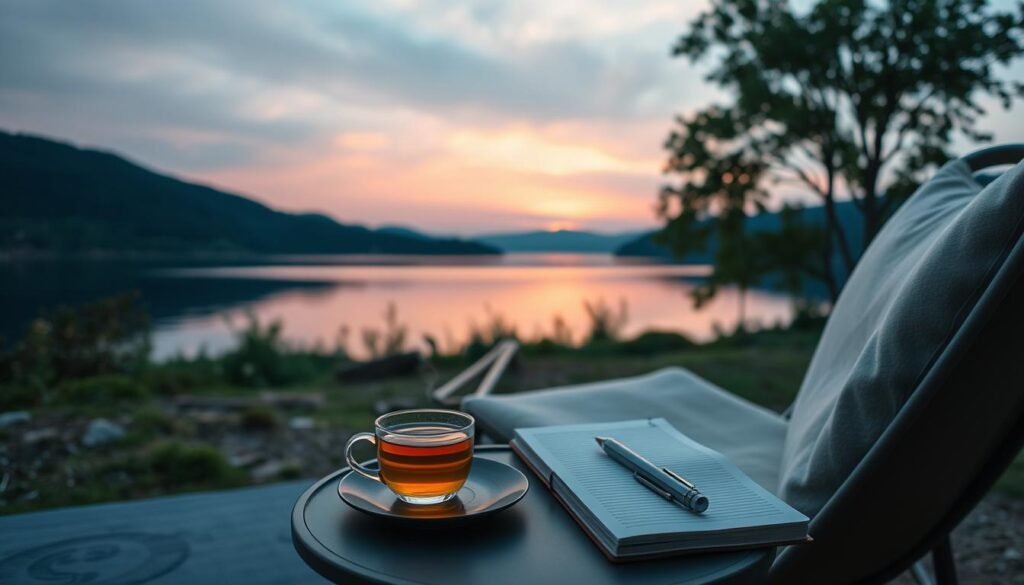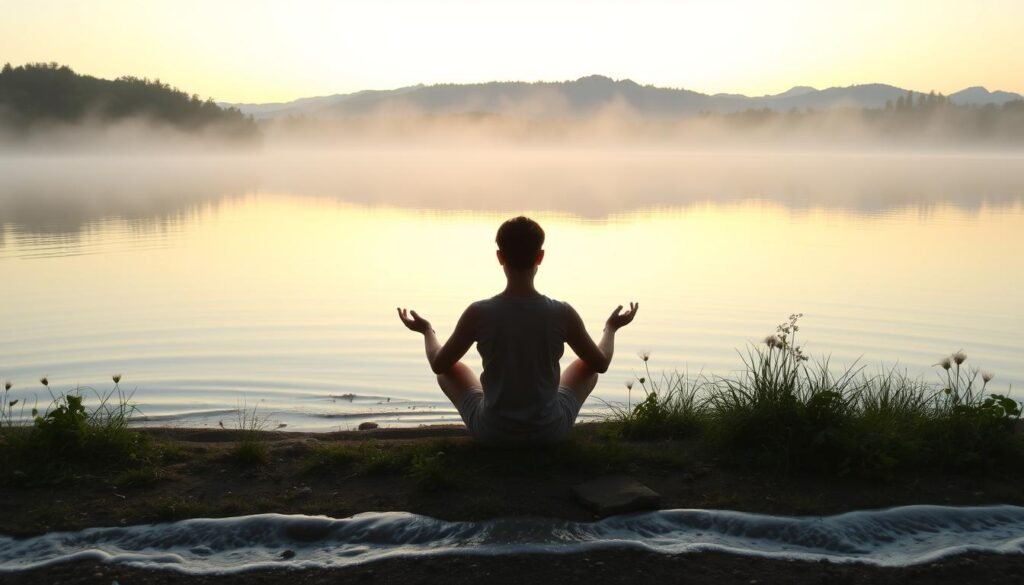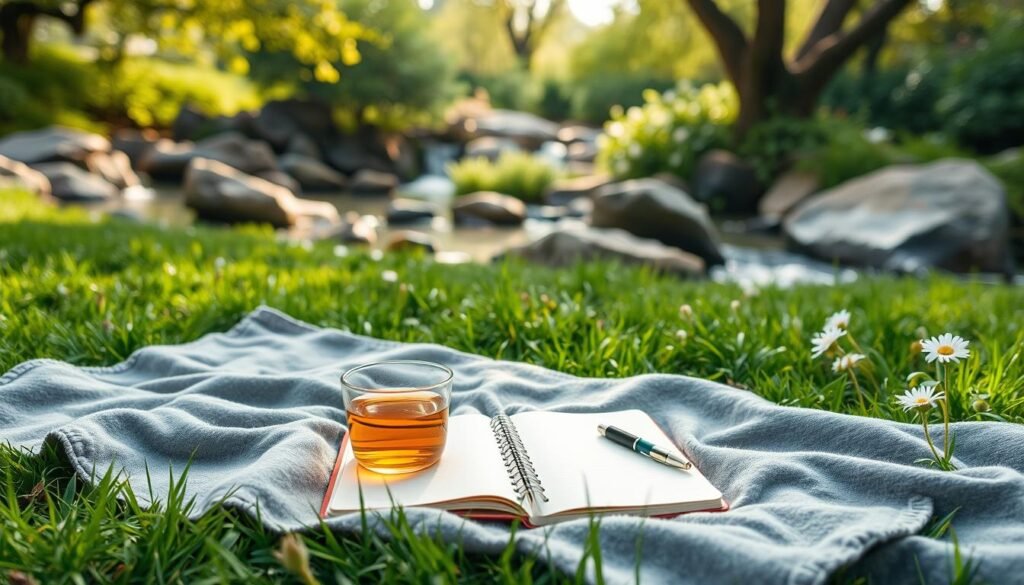A shocking 78.3% of people aged 12 or older drank alcohol at least once in 2021. But many don’t know that drinking can lead to severe anxiety, or “hangxiety.” Drinking may feel good at first. Yet, it often ends up causing fear and worry as its effects wear off. With 23.3% of adults recently binge drinking, it’s important to understand alcohol’s effect on anxiety.
This article gives key advice to handle anxiety after drinking, focusing on its root causes in our brain’s workings. You’ll learn how alcohol changes brain signals. As you read, you’ll find useful ways to ease your anxiety after having drinks. Plus, you’ll see why habits that are mindful and balanced matter.
Key Takeaways
- Understanding the connection between drinking and alcohol-induced anxiety.
- Recognizing symptoms and triggers of hangxiety.
- Implementing proven coping strategies for anxiety after drinking.
- Long-term methods to mitigate post-drinking anxiety.
- Importance of self-care and seeking professional help if necessary.
Understanding Alcohol-Induced Anxiety
Many people feel anxious when they stop drinking alcohol. This anxiety, known as “hangxiety,” makes worry and discomfort worse after drinking. It’s important to know how alcohol changes brain chemistry. This leads to a faster heart rate and guilt feelings after drinking.
What is Alcohol-Induced Anxiety?
Some people feel more anxious after they drink alcohol. This happens because alcohol messes with brain signals. At first, alcohol makes you feel relaxed and happy by boosting GABA receptors. But, when its effects decrease, anxiety symptoms like tiredness, irritability, and hopelessness can appear.
The Role of Brain Chemistry
The way alcohol affects brain chemistry is key to understanding hangxiety. Alcohol first increases GABA activity, which makes you feel calm. But, it also makes glutamate receptors more active, causing imbalance. Studies show that this can make anxiety or depression worse for some people. Drinking also raises cortisol levels, making it harder to manage emotions and increasing anxiety later.
What Causes Anxiety After Drinking?
Alcohol and anxiety have a complex relationship that affects many people. At first, drinking can make you feel relaxed. But later, it can make you more prone to anxiety. We’ll look into how alcohol affects brain chemicals and how hangover symptoms can make anxiety worse.
The Effect of Alcohol on Neurotransmitters
Alcohol changes how neurotransmitters in the brain work, making you feel calm at first. It boosts the production of *feel-good hormones* and increases GABA activity, which helps you relax. But this effect doesn’t last. When it wears off, your brain chemicals drop quickly. This drop makes you feel anxious as your brain tries to balance things out again. People who drink a lot might feel even more anxious, especially if they have mental health issues. If you keep drinking a lot, your body gets used to alcohol. You then need to drink more to feel relaxed.
Hangover Symptoms Linked to Anxiety
Hangover symptoms can make anxiety worse, a feeling some call *hangxiety*. Symptoms like nausea, headaches, and being tired can make you feel worse emotionally. These symptoms can start soon after you stop drinking, making anxiety stronger. If you drink a lot at once, you’re more likely to feel anxious afterward. This happens because of your body’s reaction to not having alcohol. Being dehydrated also makes it hard to think clearly and control your mood. This can make dealing with feelings even tougher after drinking.
| Hangover Symptoms | Impact on Anxiety |
|---|---|
| Nausea | Can lead to increased feelings of discomfort and unease. |
| Headache | Exacerbates stress levels and contributes to irritability. |
| Fatigue | Limits the ability to cope with stressors, leading to heightened vulnerability. |
| Dehydration | Affects cognitive function, making it challenging to manage emotions effectively. |
Symptom Overview: Hangxiety
Hangxiety mixes hangover and anxiety, creating a tough situation for those affected after drinking. Knowing hangxiety symptoms helps people understand their feelings post-drinking.
Common Symptoms of Hangxiety
Various symptoms come with hangover anxiety, impacting one’s well-being. They include:
- Elevated heart rate: A fast heartbeat is a common first sign.
- Shaking: Anxiety can lead to shaking.
- Excessive worry: Worrying about what was done while drunk adds to anxiety.
- Difficulty concentrating: It’s hard to focus, making daily tasks challenging.
- Muscle tension: Anxiety and stress can make muscles tight and uncomfortable.
About 20% of adults feel hangover anxiety after heavy drinking. Emotional reactions can increase anxiety, with 70% feeling dread the next day.
How Hangxiety Differs from General Anxiety
It’s key to tell hangxiety apart from general anxiety disorders. Though both involve anxiety, hangxiety links directly to drinking and withdrawal. General anxiety doesn’t depend on alcohol and can last longer. Hangover anxiety usually starts after drinking and can stay for a day or more, based on different factors.
Knowing how to handle these symptoms is crucial. Drinking water, practicing mindfulness, and knowing what triggers the anxiety can ease anxiety after drinking.
| Symptom | Occurrence Rate |
|---|---|
| Elevated Heart Rate | Approx. 12% |
| Shaking | Varies; common |
| Excessive Worry | Significant |
| Difficulty Concentrating | 40% |
| Muscle Tension | 40% |
Recognizing Triggers for Anxiety After Drinking
Knowing what causes anxiety after you drink alcohol is key. It’s important to understand the triggers of hangxiety. This helps people choose better when it comes to drinking. Main causes include heavy drinking, being sensitive to alcohol, and having family members with anxiety disorders.
Heavy Drinking and Sensitivity
Drinking a lot raises your chances of feeling anxious later. About half the people feel anxiety or “hangxiety” after drinking. For those sensitive to alcohol, these feelings are even stronger. A blood alcohol level around 0.055 might relax you at first. But, this feeling doesn’t last long.
Alcohol makes you dehydrated which can change your mood and up your anxiety. Drinking more than three drinks makes about 33% of people less able to think clearly. This can make anxiety worse.
Family History of Anxiety Disorders
Having family with anxiety might mean you’ll feel worse after drinking. Genetics show a link between anxious families and hangxiety. Young adults with anxiety disorders often say they feel more anxious after drinking. Also, shy people feel more anxious the next day than those who are not shy. This shows how our actions, the environment, and our genes play a role. Knowing this can help people make smarter choices about drinking.
Proven Tips for Coping with Anxiety After Drinking
Dealing with anxiety after drinking involves simple steps. These include exercising, staying hydrated, and trying breathing exercises. These methods are effective for managing anxiety.
Getting Started with Exercise
Regular exercise helps fight off anxiety related to alcohol. It makes the body release endorphins, improving your mood and helping you relax. From quick walks to intense workouts, exercise acts as a healthy escape from stress.
The Importance of Hydration
It’s key to drink plenty of fluids after alcohol. Alcohol can dry you out, making anxiety worse. So, drink water or drinks filled with electrolytes to get back in balance and reduce hangover symptoms. Staying hydrated boosts overall health and helps keep anxiety levels low.
Breathing Exercises for Immediate Relief
For quick anxiety relief, try breathing exercises. Slow, deep breaths can help relax your mind and bring your anxiety levels down. Adding a few minutes of these exercises to your daily routine can ease tension and make your mind clearer.
| Technique | Benefits |
|---|---|
| Exercise | Releases endorphins, reduces stress, and improves mood. |
| Hydration | Restores electrolyte balance and alleviates hangover symptoms. |
| Breathing Exercises | Enhances relaxation, decreases tension, and improves focus. |
How to Reduce Anxiety Caused by Alcohol
For those dealing with anxiety from drinking, knowing effective strategies is key. Mindfulness and a healthy diet are very important. They help reduce anxiety and improve your overall health.
Mindfulness and Meditation Techniques
Practicing mindfulness means living in the moment and reducing worries. Methods like guided meditation relax you and slow down your thoughts. Doing mindfulness exercises regularly helps with stress and teaches you to manage anxiety from drinking. This way, you learn to control your thoughts and feelings better.
Nutritious Eating for Recovery
Eating well is crucial for lessening alcohol-induced anxiety. Foods high in vitamins and minerals, like vegetables, eggs, and grains, help your brain and mood. Studies show that the right diet improves mental health. A balanced diet can ease the anxiety after drinking, especially with enough water. Drinking water equally when you drink alcohol balances its impact on your mind and body. This approach helps you deal with anxiety effectively.

Managing Post-Drinking Anxiety
Managing anxiety after drinking means pacing your drinks and eating right. These steps change how you feel during and after drinking. They make the experience better and reduce negative effects.
Pacing Alcohol Intake
To lessen anxiety after drinking, be mindful of how much you drink. A limit of two drinks can cut down on hangxiety. Keeping a 1:1 water to alcohol drink ratio helps too. This keeps you hydrated and fights anxiety.
Choosing non-alcoholic drinks is also key. 89% of people think having non-alcoholic options is important. Alternating between alcoholic and non-alcoholic drinks can keep you feeling good. It also lessens bad outcomes.
Healthy Eating Before and During Drinking
Eating well can change your drinking experience. Choose foods like fruits, veggies, and lean proteins. These foods keep you healthy and help your body handle alcohol better.
Keeping a balanced diet maintains your mood and reduces bad symptoms like irritability. 95% of people would go to places that offer healthy drinks and food. This shows people want to drink mindfully.
| Strategy | Benefits | Statistics |
|---|---|---|
| Pacing Alcohol Intake | Reduces symptoms of hangxiety; maintains hydration | 1:1 water to alcohol ratio recommended |
| Healthy Eating | Regulates mood; lessens hangover effects | 89% prioritize non-alcoholic options |
By following these tips, dealing with anxiety after drinking becomes easier. It makes social drinking more enjoyable and less worrying.
Long-term Strategies for Dealing with Post-Drinking Anxiety
Dealing with hangxiety needs long-term plans focused on growing and knowing yourself better. It’s key to see how we drink and its link to anxiety. By spotting our drinking habits, we can choose better for our mental health.
Identifying Patterns in Drinking Habits
Around 22% of young adults under 30 experience hangxiety. Knowing how we drink is crucial. You could use apps like MyDrinkaware to watch your drinking. This helps spot trends and make changes to avoid future anxiety. Pacing your drinking and setting alcohol-free days are good steps for well-being. Learn more about coping strategies at developing long-term strategies for hangxiety.
Seeking Professional Help When Necessary
Not everyone can handle anxiety on their own. If hangxiety or other anxiety issues happen a lot, getting help is smart. Therapy gives tools to manage these feelings. Experts can guide based on how you interact with alcohol. If anxiety messes with your life or you feel bad about drinking, it’s time to get help. Turning to professionals can improve how you manage emotions and recover.

Support for Anxiety After Drinking
It’s tough to deal with anxiety after drinking. But, there are good ways to help with this anxiety. Things like taking care of yourself and getting the right help can make a big difference. They can help you drink less and feel better mentally.
Self-Care Practices
Self-care can really help with hangxiety. Doing different things to take care of yourself can make you feel less anxious. Here’s what you can try:
- Physical Activity: Moving around, like walking or yoga, can make you happier and less anxious.
- Mindfulness and Meditation: Being mindful can help you manage your emotions and feel less anxious.
- Nourishing Food: Eating well helps keep your mood and energy up, fighting the downsides of drinking.
Professional Resources and Therapy Options
Getting help from a professional is key for people who are anxious. Different kinds of therapy can help with anxiety after drinking. These include:
- Cognitive Behavioral Therapy (CBT): This method helps change the bad thoughts linked to drinking and anxiety.
- Group Therapy: Talking with others who understand can make you feel supported and less alone.
- Medication: Sometimes, medicine is needed to deal with anxiety made worse by alcohol.
Having people to support you is very important for recovery. It helps you face your problems and develop new, healthy habits. This is a big step in overcoming anxiety tied to drinking.
| Self-Care Practice | Description | Benefits |
|---|---|---|
| Physical Activity | Engaging in exercises such as walking or yoga. | Improves mood, reduces anxiety levels. |
| Mindfulness Techniques | Practicing meditation and deep breathing exercises. | Enhances emotional regulation and focus. |
| Nutritional Support | Consuming a balanced diet full of whole foods. | Sustains energy and improves overall mental health. |
Preventing Future Episodes of Anxiety After Drinking
Learning how to avoid anxiety after drinking is key to a healthier alcohol use. Setting personal drinking limits and finding other ways to have fun can greatly lower hangxiety risks.
Understanding Your Limits
It’s vital to know how much alcohol is too much. Studies show that staying below four drinks a day, and ten per week, cuts down alcohol-related risks. Knowing how much you can handle helps avoid drinking-related anxiety and makes socializing more fun. Genetics also matter, as it affects how severe hangovers and their emotional impacts can be, with nearly half the risk coming from our genes.
Alternatives to Drinking for Socializing
There are fun ways to socialize without alcohol. Things like coffee dates, outdoor sports, or game nights don’t need alcohol to be enjoyable. These activities help build relationships without the focus on drinking. Since about 22% of social drinkers face hangover anxiety, changing up how we socialize is crucial. It helps avoid the stress and discomfort that comes after drinking. For more tips on handling anxiety post-drinking, check out this article.

Conclusion
Drinking alcohol and feeling anxious are closely linked, affecting our mental health. A study shows about 60% of people feel anxious after drinking, calling it “hangxiety.” This shows we need good ways to control drinking and anxiety.
To lessen the chance of anxiety, try to drink slowly, eat healthily, and avoid too much alcohol. Knowing how alcohol changes our brain chemicals and body water is key. This knowledge helps in handling hangxiety.
It’s important to share knowledge and self-care tips to ease anxiety after drinking. Talking with friends who support you or getting professional advice can make a big difference. For more information on managing alcohol-related anxiety, you can read some useful studies here.